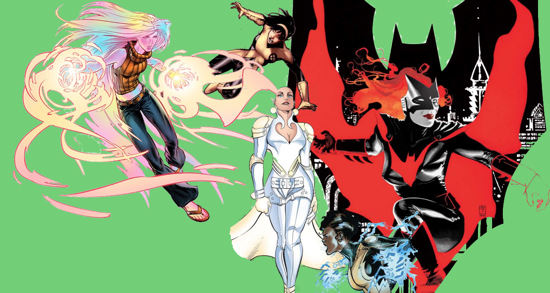Martha Thomases: Diving Into Diversity
One of the most exciting developments in the comic book industry in my lifetime has been the increased diversity, both in content and in creators. It is no longer a given that only straight cis white men can be writers, artists, or heroes.
It’s something we champion here at ComicMix. Many of our contributors (including but not limited to this person, this person, and this person) discuss these issues on a regular basis.
I really love this. As a reader, it means I have a lot more different kinds of stories to sample. More stories means a greater chance to find something I like, or something that challenges me, or something that shows me something I haven’t seen before.
As a writer, it’s something I find more difficult.
When you are part of a minority group, whether through race, religion, ethnic heritage, sexual and affectional preferences, gender identity, body type or otherwise, you pretty much know how straight cis white guys see the world. Almost all of our art, music, writing, cinema and entertainment is from the perspective of straight cis white guys. Cis straight white guys are the default perspective in modern culture.
So, as a white woman, I feel comfortable and confident writing characters who are white women and men. As a Jew, I feel pretty comfortable writing about Christians as well as Jews. My problems arise when I try to write characters who are different from me in ways I might not fully understand. For example, I’ve been attracted to women in my life, but I have no idea how one acts on that attraction because, for me, it’s never been strong enough to go for it.
It’s not that the stories of people who are not either the default acceptable types or their female counterparts are not worth telling. I’m just not sure I’m the person who should tell them. It’s all too easy to stereotype someone who has different experiences than I do or, even worse, use them as archetypes and not real people. This article, although written about improv comedy, shows the how easy it is to unconsciously limit and even demean someone when you see only her differences, not her humanity.
The pitfalls arise, in my opinion, when the person in power sees those who are different only from this perspective. To use my previous example, I might be able to imagine, broadly, what being a lesbian feels like, but I don’t have any idea about the myriad obstacles and bliss in a dyke’s daily life. It would be all too easy for me to think my lesbian character is all about breasts and labia and coming out, and not how she thinks about getting the rent together every month, or whether a vegan diet is a good idea, or if she should make a play for the cute and possibly straight woman in accounting. She should be a fully-rounded human being, not just a contrast to the default assumption.
Does this mean I should avoid writing lesbian characters? There isn’t one single answer to that. It might be that I lack the skill. It might be that I should ask a queer friend to read what I write and point out where I’ve missed the point. It might be that I should just assume that, among my characters, there are queer people in roughly the same proportions as the general population, and let it go at that. In my real life, I know lots of people without knowing who they would prefer to have sex with. The same can be true in any fictional universe I create.
This might be useful things to consider as a writer. What about as a producer, someone who is, essentially, a gatekeeper about what amusements are available to the public? How does he consider the responses his audience might have, and whether that response is what he meant to convey? In this example, a video game company created a game that attempts to show a former soldier fighting organized crime in a fictionalized New Orleans in 1968. One would expect criminals at that time and place to be racist as all get-out. Does using the language that those people would have used add to the gaming experience or distract from it? What if it only distracts black players?
As we continue to explore this brave new diverse world, a bunch of us are going to make mistakes, some well-meaning and some no so well-meaning. If your mistakes fall into the latter group, you might think you’re a brave truth-teller fighting political correctness, but I think you’re an asshole.
For the rest of us, we’re going to have to take the criticism, absorb it, and see if we told the story we wanted to tell in a way that was understood the way we wanted. If we made a mistake, we have to try harder.
Every piece of entertainment cannot be all things to all people. Every story, every movie, doesn’t have to represent every possible experience. All people should be able to easily find stories with which they can relate, that make them laugh (and cry) in recognition.












